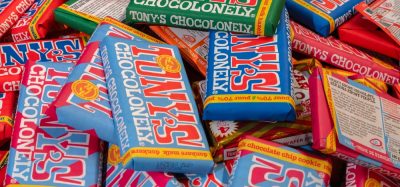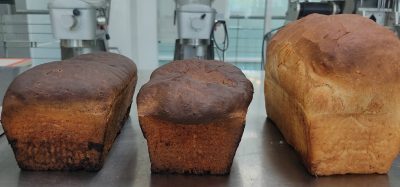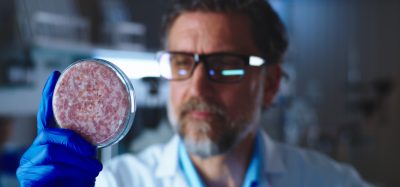A soup-er idea
- Like
- Digg
- Del
- Tumblr
- VKontakte
- Buffer
- Love This
- Odnoklassniki
- Meneame
- Blogger
- Amazon
- Yahoo Mail
- Gmail
- AOL
- Newsvine
- HackerNews
- Evernote
- MySpace
- Mail.ru
- Viadeo
- Line
- Comments
- Yummly
- SMS
- Viber
- Telegram
- Subscribe
- Skype
- Facebook Messenger
- Kakao
- LiveJournal
- Yammer
- Edgar
- Fintel
- Mix
- Instapaper
- Copy Link
Posted: 12 November 2020 | Jelle Goossens | No comments yet
2020’s pandemic brought with it a unique challenge; food aid organisations and social grocers saw growing demand as a rising number of individuals and families struggled to make ends meet, while at the same time, farmers’ usual supply chains were disrupted, causing an increase in surplus food. Here, New Food hears how Robin Food helped during these difficult times.
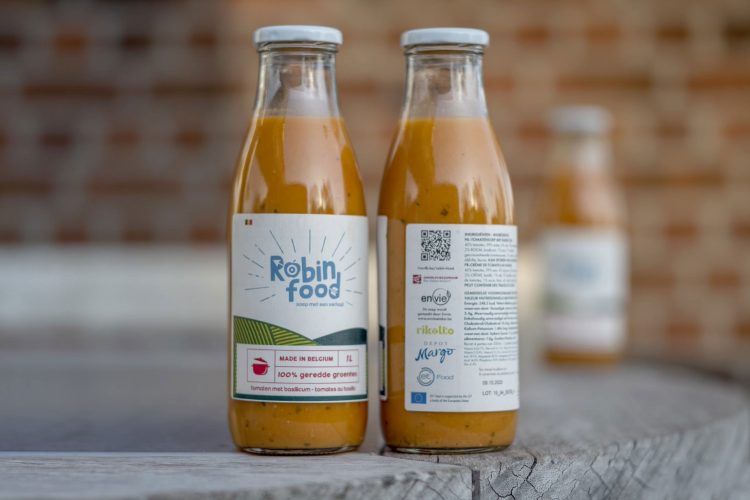

Here, New Food hears from Jelle Goossens, communications officer at Rikolto, Belgium, about the challenges of food insecurity and food waste, and the important work its brand Robin Food is undertaking to help redirect food supplies to those who need it most.
Building a more resilient food system
COVID-19 has indeed demonstrated the fragility of long, complex supply chains. At Rikolto, we believe in transparent, fair and ecologically sound value chains. We must strike the right balance between efficiency and resilience by keeping supply chains as short and simple as possible for the bulk of our food, and as long as needed for products that we can’t grow ourselves.
In our everyday work, we do this by implementing inclusive business principles: establishing collaboration among the value chain stakeholders, brokering long-term business relationships in which risks and profits are shared in an equitable way, coordinating volumes and quality standards, and ensuring innovations also take account of the need of the farmers.
In these supply chains, actors are not anonymous to one another, but accountable, so everybody feels a responsibility for the whole, rather than for their own profit.
What is Robin Food?
Robin Food was launched in April this year in Belgium in the midst of the COVID-19 crisis. Due to the sudden economic shock, a growing group of people found themselves without enough means to feed themselves and their families. As a result, food aid organisations and social grocers saw an increase in demand, while less food surplus was coming through supermarkets, because some people in Belgium were hoarding toilet paper and food products.
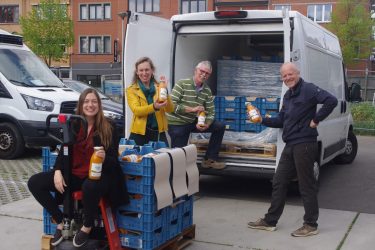

The Robin Food team hard at work
In addition, farmers were confronted with large vegetable surplus, partly due to the closure of the catering industry and the challenges of exporting. Through enVie, a social enterprise that produces soup from Belgian surplus vegetables, we have been able to collaborate with its partner/co-founder REO Veiling (a fruit and vegetable auction), that has also felt the consequences of COVID-19 having larger volumes of surplus products.
With Robin Food, we can give value to more of these surplus vegetables by processing them into soups. Thanks to the network of Community Development Riso Vlaams-Brabant, the soup is distributed to those who need it most, for example through the social grocers.
Even when restaurants and catering businesses reopened, the challenge of food surplus remained. The problems for socially vulnerable groups have also been exacerbated by COVID-19. As a result of the economic situation ahead of us, the number of people from socially vulnerable backgrounds is unfortunately likely to grow even more.
The Robin Food initiative now has increased its impact beyond national borders and continues its efforts in other countries across Europe. Thanks to an Innovation Fund investment from European Institute of Innovation & Technology (EIT) Food, a powerful partnership was established between Dutch, Belgian and Spanish organisations. As part of the EIT’s Crisis Response Initiative, this activity directly contributes to the European Union’s response to the COVID-19 pandemic. The partnership aims to develop at least three new products that will be launched to the market by the end of 2020 and one additional product by the end of 2021.
Copa-Cogeca praises fruit and veg sector for handling first wave, but Brits still worried
In all participating countries, the processing companies who are involved work with people that have a distance to the regular job market and support them to enter the regular job market.
In the meantime, Robin Food has been registered as a trademark. Other companies that are processing food leftovers to give better access to healthy food for people in vulnerable conditions may apply with Riso to use the Robin Food brand.
To make the efforts of the project truly sustainable, a viable business model must be developed. One that allows affordable prices for vulnerable groups but also enables food processing companies or catering facilities to cover their costs. “One of the mechanisms we will explore will be to also sell the products to ‘solidary’ consumers who are willing to pay a bit more for the product and, by doing so, support vulnerable groups,” said Liesbeth Smeyers from Community Development Riso Vlaams-Brabant, which is already applying this model.
Food security
Malnutrition and obesity are often the sides of the same coin: poverty. The corona crisis aggravates this by pushing more households to the brink.
There’s no simple solution. It requires a comprehensive approach, involving housing, education, employment, viable minimum wages, etc.
A project like Robin Food can’t be the single answer to this, but it provides without any doubt some pieces of the puzzle. Access to healthy, nutritious food is basic human right and through the social organisations involved in the project, we can ensure that the products we create are fit for the target group. Thanks to the solidary business model that we’re developing, we ensure that there’s no financial barrier to eating healthy.
Also, working with surplus food production helps to reduce food waste. Food waste is an important element in climate change, because it increases the pressure on land-use. If we can reduce the demand for food, by reducing food waste, this helps mitigating the climate crisis we are facing.
Another aspect of the Robin Food is social employment. In all participating countries, the processing companies who are involved work with people that have a distance to the regular job market and support them to enter the regular job market. The Belgian start-up enVie, for example, is one of them. In the scope of three years, they have hired and trained 12 individuals with very different backgrounds. Their work at enVie gives them the training and practical experience to become a Food Sector Manufacturing Agent. In addition to their work, enVie offers them training in professional skills for them to re-enter the job market with self-confidence and good work ethics. Simultaneously, enVie guides them to plan their future afterwards.
Food waste
The Robin Food project unites companies and organisations to valorise food leftovers at production level by turning them into valuable products. We aim to offer these products mainly to vulnerable groups. In order to do this, we will look for a business model that makes the products accessible/affordable for vulnerable groups and at conditions that are also viable for the production companies that are involved.
Currently, together with RISO and the other partners, we are studying a potential business model. Our Partner De Verspillingsfabriek from the Netherlands referred us to a Dutch platform ‘Verspilling is verrukkelijk’, a coalition of 15 entrepreneurs that could also inspire us, because they focus on turning food waste in delicious food products.
Surplus vegetables
Throughout the year, the agricultural sector is confronted with temporary production surpluses, due to seasonal fluctuations. When these surpluses enter the regular market, they lead to price drops. However, when prices do drop below a certain low cut-off price, the auction can decide to no longer sell the products and protect the farmers against too low prices. Then there is a food surplus of fresh fruit or vegetables. The auction can then decide to sell this surplus at very low prices to alternative channels that are not competing with the regular market of fresh products. 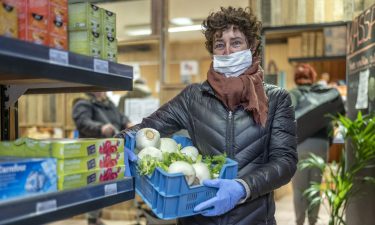

The COVID-19 crisis made this even more urgent. Due to Corona, several disruptions have affected all the stages of the food chain, from production to consumption. Consumer demand has shifted from Out of Home to retail. Most restaurants and institutional kitchens (companies, schools, etc.) closed during the lockdowns – only take away and home delivery were still operational. Most people are now buying their food in the retail.
Why are ‘ugly’ fruit and vegetables shunned?
Rejecting fruit and veg due to cosmetic reasons is related to supermarket quality standards, as well as more practical considerations – ie, uniform products are easier to stock.
As consumers, we’re used to perfectly shaped fruit and vegetables, which is why a lot of consumers are reluctant to buy products that don’t fit the status quo. However, a lot of awareness has been built these last years; some supermarkets actively promote ‘ugly’ fruits and vegetables to their customers in an appeal to tackle food waste.
However, a more robust channel for imperfect fruit and vegetables is processing. By processing these products into soup, juice, fries, stew, etc., you end up with a higher value product with a longer shelf life. That’s exactly what the Robin Food partnership is aiming at.
Making soup from surplus food
In Belgium, enVie collaborates with its partner and co-founder, REO Veiling. With Robin Food we can give value to more of these surplus vegetables by processing them into soups.
Support from the EIT Food Innovation Fund means we can improve the soup, making it tastier. Andrea, a post-graduate student from the KU Leuven, is now working on this.
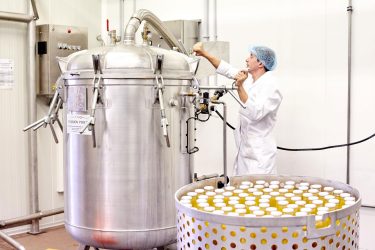

Behind the scenes at Robin Food
Thanks to the network of Community Development Riso Vlaams-Brabant, the soup is distributed to those who need it most, for example through the social grocers.
In the Netherlands, De Verspillingsfabriek is working on improving the nutriscore of its soup from B to A. Also, in Spain Robin Food has a soup in its assortment.
In a first trial in the months of April and May, we reached out to 2,000 families per week in two Belgium provinces; we plan to scale up to other provinces in Belgium. So far, we have collected funds to produce 70,000 liters of soup.
Food waste reduction
We have no other option but to reduce our global levels of food waste; it is a big contributor to climate change. The more food we can save, the less pressure we’ll put on our soils and ecosystems.
By better coordinating volumes through improved collaborating in the supply chain, we could already reduce a part of the structural surpluses.
Apart from that, the agricultural sector is confronted with temporary production surpluses due to seasonal fluctuations or sudden shocks, such as COVID-19. When these surpluses enter the regular market, they can have a disruptive impact by causing big price drops. Therefore, it’s better to find alternative channels for these surpluses that don’t conflict with the regular market, as well as structural mechanisms to turn temporary surpluses into high value, non-perishable products.
Our ambition is to turn Robin Food into such a mechanism.
About the author
Jelle Goossens is a communications officer at Rikolto in Belgium. He has a background in communications sciences, with a special interest in marketing, psychology, and the politics and economics behind our food. Jelle is also a guest lecturer for the course Globalisation & Sustainable Development at the UCLL (University College Leuven Limburg).
Related topics
COVID-19, Food Security, Food Waste, Supply chain, Trade & Economy
Related organisations
De Verspillingsfabriek, EIT Food, EnVie, KU Leuven, REO Veiling, Rikolto, Riso Vlaams-Brabant, Robin Foods, University College Leuven Limburg




